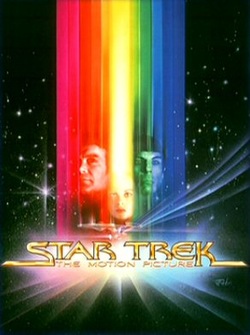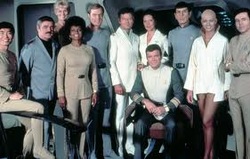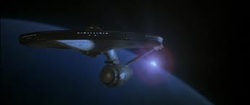
Star Trek: The Motion Picture is, in retrospect, on of the strangest films ever made, pretty much by any standards. It doesn't feel very much like a post-Star Wars sci-fi blockbuster, feels at odds with the following original cast Trek films and by being one of the very first films based on an American TV series it's missing most of what would subsequently become the standard rules for translating something from the small to the big screen. So much of it feels very, very odd.
Now of course, it's slightly unfair to call a film odd just because no one had yet decided that the best way to do a TV based film was to completely recast it, throw in some heavy irony and give the original actors tokenistic cameo roles (the '09 film, despite not technically being a remake, otherwise shows how to do that sort of thing right). Nor to criticise it for not being more like Trek films as yet unmade. But, for me, this is one of the things I enjoy most about the film, it's different and a type of movie that would never, ever be made today. Arguably with good reason as it's deeply flawed in many ways, but at least that makes it more interesting to watch.
Another problem the film had was immense behind the scenes problems. Gene Roddenberry had somewhat shifted his view of what Star Trek was since the series ended, mainly thanks to him having made most of his income in the interim from doing the collage lecture circuit and having crafted his opinions to fit the audience. The more rock'em'sock'em approach of the series had been replaced by a (supposedly) deep philosophical conflict free outlook that would eventually come to full fruition in the early days of The Next Generation before Rick Berman (in the time before his vilification he was actually seen as the man who saved TNG) managed to get more control and turn the program into something actually interesting to watch.
Roddenberry's desire to stick to his “vision”, couple with him apparently being something of a control freak and not the easiest of people to get along with, caused arguments and close to full blown fights throughout the production, especially over the script which still didn't have a final act when they started filming. Which caused massive delays, budget overruns and, along with problems with then special effects company originally hired, prevented Robert Wise- probably the biggest “name” director Trek has ever had and who ended up with the somewhat thankless task of making the final film work as well as it does- from being able to finish editing the movie properly before its release. Hence the endless shots of not very much happening. They basically had to dump the effects shots in the film as they arrived with no time to trim or edit them.

Now of course, many of the plots of even the better Trek films can seem trite when boiled down to a paragraph (“Space whales are so pissed off we've killed their terrestrial cousins they attack the oceans and Kirk has to use Christopher Lloyd's time machine to go solve the problem with some amusing 80's culture clash comedy”), but where The Motion Picture fails is it takes its rather trite plot way too seriously. Whilst some of this is likely down to the lack of editing time making things seem more ponderous than originally intended, everyone involved was still thinking in terms of 2001 when they were making it. Even though the final message of “Emotions are good and humans are generally pretty awesome m'kay” is not only no great shakes, it's one the TV show had done so often it can't help but some old hat.
It doesn't help that, most likely because the script was being hurriedly finished as it was being filmed, several of the plot lines set up by the film don't get any proper conclusion. The most obvious example being Kirk's desire to command the ship overriding all other concerns. Decker (who in another example of recycling would become the basis for Commander Riker, with his lover interest Ilia becoming Troi) is entirely right in his concerns that Kirk isn't the right person to be Captaining the ship on this mission after two years behind a desk, but the two of them pretty much stop disagreeing around the time they arrive at V'Ger with no pay off. Indeed, Decker's obviously such a capable Captain it's hard not to feel Kirk's arc should be needing to learn to let go and move on with his life, which makes Decker's convenient “death” allowing Kirk to just take over with no problems seem even odder. The second film, as part of it's “Lets pretend the first one didn't happen” ethos would do the “Kirk shouldn't be an Admiral” thing again, but much much better.
And of course, famously, just about all of the model sequences are far, far too long, Even the best of them, the frankly gorgeous tour of the Enterprise, makes its point that Kirk really loves his ship about halfway through its running time. Again, the cut-down reuse of this sequence in the second film conveys exactly the same feeling in a much punchier fashion. The scariest thing is, this tour of the outside of the ship with Scotty is the longest amount of time Kirk will spend alone one on one with any of the main cast outside of Spock and McCoy in any of the films (possibly ever). And for most of it they're not even saying anything, just standing there staring straight ahead in the sort of slightly awkward silence you have a sneaking suspicion was not unknown to Shatner and Doohan's real life relationship.
And that's still the best effects moment of the film because the Enterprise is at least an important character (hell, she gets more lengthy close ups than Sulu does) and it's a chance to show off the redesign. When the shuttle that brings Spock on-board gets a similar lengthy sequence despite being of no importance whatsoever (at this stage he could have just been beamed aboard from it as well rather than the endless docking) and never being seen again it feels like someone's taking the piss.
The tour of V'Ger's outside is marginally better as it's at least relevant to the film to establish its sheer size and power, but again, it goes on too long, and with the endless shots of characters staring at the viewscreen saying nothing winds up feeling like you're watching people watching the movie. Like you've accidentally put on an in-vision commentary for an old film where none of the people can really remember a lot about it and don't say very much.
So with all those flaws, what does work here? The effects are all amazing and still stand up well today, the fact this had the highest (relative) budget of the original cast films shines through in every shot. They're overdone, but they're at least very pretty. Jerry Goldsmith also uses the long periods of not much happening to just go to town with the score, with so little movement on screen to match it too he's basically done a full symphony that works brilliantly in its own right as music.
The Klingon sequence that opens the film is great as well, moody and atmospheric in ways the rest of the movie isn't. And in a picture where most of the secondary characters don't get a lot to do Chekov manages to steal the entire film with his (very likely completely unintentionally) hilarious slow motion “PHHHHHHHHHOOOOOOOOOOTTTTTOOOOOOOOOONNNNNNNN TTTTTTTTTOOOOOORRRRRRRRRRPPPPPPPPPEEEEEEEEDDDDDDDDOOOOOOO!!!!!!!!” moment. Indeed, the cast in general do as good a job as they can, at least trying to make themselves look interested in the long staring scenes. Though Persis Khambatta at Ilia is genuinely terrible, making even playing the emotionless blank robot version of her character seem unconvincing.
The transporter accident that kills two crew-members is also rather wonderful, being a nicely nasty moment of horror that adds some much needed life to the early part of the film.
The most satisfying part of the whole film however is Spock's journey. Starting off with him prepared to sacrifice all his remaining human emotion to become more Vulcan, his epiphany after his mind meld with V'ger that there needs to be more to life is the successful completion of the arc he's been on since the start of the series, and will become one of the few things from this movie to be carried over to the next as Wrath of Khan sees a more relaxed and at ease with himself Spock as a result of this (though his death and subsequent need to get back in touch with his human side all over again during Star Trek IV makes this a very short lived carry over). It might not be an especially deep message, but the emotional investment we have in Spock's character after a decade makes this a surprisingly moving moment, even if the scene of him holding Kirk's hand and talking about “This simple feeling” has become fodder for the slash fiction brigade (tellingly the novelization includes a footnote to the effect Kirk and Spock are just good friends really in an attempt to shut them up. Mind, the same book is worryingly obsessed with Kirk's genitals in places so it's a bit of a mixed message).

There are actually three versions of the movie. The theatrical cut, the ABC TV version that actually manages to be longer (and includes by mistake a brief scene of Kirk leaving the Enterprise from an aborted “Memory wall” sequence that was ultimately replaced by Spock's mind meld space walk, meaning Kirk not only winds up wearing two completely different space suits but when he comes out the airlock you can actually see the scaffolding holding up the Enterprise exterior because the effects work wasn't finished) and the 2001 Directors Cut. Despite such things having been giving a bad name by George Lucas the later is actually the best version in my opinion, not perfect by any means but it does tighten the pacing up and the new effects are done with a great deal of sympathy for the original material. Sadly the more recent DVD and Blu-Ray only has the theatrical cut on it, supposedly because the new effects weren't considered good enough for HD. Personally, considering the extra capacity of Blu Ray for seamless branching I'd have included all three versions to keep everyone happy, with one good HD copy of the film on the disc I think people would have been fine with one of the extra versions being of lesser picture quality in certain scenes.
One annoying side effect of this is that the Blu-Ray actually has less special features than the 2001 two disc DVD. Whilst I can understand dropping the documentary specifically on the extended version it's a shame to lose the other making of features, especially the one on Phase II. Whilst the new documentary seems to be a bit more honest about the behind the scenes problems, at only ten minutes in length it can only briefly touch on each aspect of the making of the the movie it covers.
The most damning thing I can say about the film is that, when I was a kid and my family taped it off ITV my mother effectively produced her own “Special Edition” by cheerfully using the pause button during any sequence she regarded as being too long. And, if not for the brief break up in picture and sound, you'd never be able to tell. But it's still hard to hate something that was at least made with good intentions and still manages some enjoyable moments. The Wrath of Khan is still the place to start for anyone coming to the films for the first time, but The Motion Picture can still, under the right circumstances, pass the time in an enjoyable enough fashion. And it introduces what is, hands down, the single best Enterprise design of the lot. Taking the already awesome TV look and ramming 500% more awesome in there. That might not be enough to make the film as a whole better than average, but at least its pretty to look at.
Two and a half PHHHHHHOOOOTTTTTTOOOOOOOOOOONNNNNNNN TTTTOOOOOOORRRRRRPPPPPPPPPPEEEEEEEEEEDDDDDDDOOOOOOOOOOSSSSSSSSS out of five.
 RSS Feed
RSS Feed
